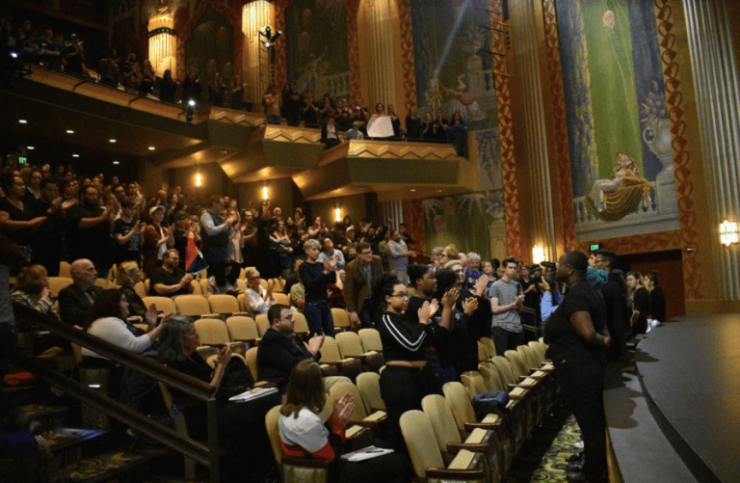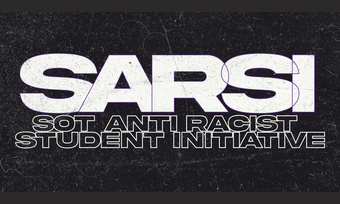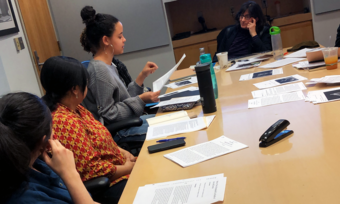How to be an Active Artist
Reflections on Emerson College's Teach-In On Race
Earlier this fall, Emerson College hosted a day-long Teach-in on Race. The day was supposed to give the Emerson community a chance to come together and talk about how prejudice and race manifest in the school and in the fields Emerson students are training to enter. As an acting major, I am well aware of the systematic injustices that are rampant within my field, but I admit I sometimes do not know what is the best way I can use my privilege to create change. Seeing that one of the panels for the day was called the "Current Crisis on Casting in Theatre and Media," I thought it was the perfect chance for me to be able to find some answers, or at least get some pointers as to things that I could do now.
As an acting major, I am well aware of the systematic injustices that are rampant within my field, but I admit I sometimes do not know what is the best way I can use my privilege to create change.
The panel was moderated by Ken Cheeseman, a Boston actor and acting professor at Emerson. He led the discussion with Kirsten Greenidge, a local Boston playwright (currently playwright in residence with Company One Theater via the National Playwright Residency Program) and an Assistant Professor of Playwriting and Theatre Arts at Boston University, and Miranda Adekoje, a producer for Beyond Measures Production LLC. The pair mostly took questions from the crowd, which consisted of students from Emerson and neighboring colleges, who were there for the same reason I was: to try and find some answers. Below is a condensed list of actions Greenidge and Adekjoe gave us to create change in our fields.
- Make yourself a personal ethics statement. Know what you stand for, and stand for it.
- "Your no means more than your yes"—Miranda Adekoje. Say no to things you believe are wrong, or are going to be made with the wrong people, or you believe may perpetuate oppressive structures. Your career will be so much more fulfilling if you can look back at what you made and stand behind it.
- Do your research. If you are writing about an identify or experience you feel like you don’t know the full extent of, ask someone. Be a dramaturg with your work. There is no reason that you cannot research what it is like to have Obsessive Compulsive Disorder just like you would research the historical background of a battle your character fights in.
- Allies: Know you will mess up. Know that things will get hairy and sticky and very uncomfortable. When you do mess up, own it, apologize, and learn from your mistake.
- When things do get sticky, speak up.
- Learn how to produce. Learn how to bring people together, and how to delegate tasks so that the thing you want to make gets done. If you know how to produce, you know how to make your own work heard, and are able to tell your story.
It turns out that Emerson students didn’t take that long to put what they had learned into practice. On the 23 October 2017, the Emerson student organization POWER, a group on campus devoted to increasing Emerson’s commitment to and accountability for inclusion and diverse practices, led a student walk out demanding that the administration keep their word about making an active effort to dismantle institutional racism. These students are not alone in demanding active change from their administrations—on 18 October students walked out at Boston College for the same reason. Two years before that there were walkouts at University of Missouri, Yale, and many other colleges and high schools.
As students, we look to our institutions to model our expectations of the professional field. ... if we are incubated in an inequatible environment, it is harder to acknowledge, or fight against, inequities in the professional world.
The students put together an incredibly well thought out and detailed list of demands that would greatly improve the cultural environment on campus. They stated these demands in a petition they circulated through the Emerson community which covers three aspects: cultural competency for students and staff; recruitment and retention of diverse students, faculty, and staff; and public accountability of the college about these aspects. The students of POWER acted in the very way Emerson taught them to: they put together a detailed, community-oriented, and professional effort.

While this was not directly an "artistic" act, so to speak, the leaders of POWER and their student allies took action out of a deep sense of wanting to do what they thought was right, and speaking truth to power from that place, just like Greenridge and Adekoje urged them to do. The faculty on the whole was receptive to the students’ ideas, and the walk out led to a series of discussions in classrooms all across the campus about ways in which those spaces could be more inclusive and receptive to the multitude of stories present at Emerson.
As students, we look to our institutions to model our expectations of the professional field. A learning environment is where you are incubated, and if we are incubated in an inequtiable environment, it is harder to acknowledge, or fight against, inequities in the professional world. Thankfully, we have professionals like Greenidge and Adekoje who are working to make the field better. And we have a community on campus that is willing to engage in difficult conversations to implement change.
I am in awe of my friends and peers’ strength and devotion to advancing the voices of the unheard—even when those voices are their own—and count myself very fortunate to learn such fundamental lessons in art and life from my peers. Emerson is still not perfect, and there is much more work to be done here. But the steps are in place. Now is the time for informed action, as it has always been.












Comments
The article is just the start of the conversation—we want to know what you think about this subject, too! HowlRound is a space for knowledge-sharing, and we welcome spirited, thoughtful, and on-topic dialogue. Find our full comments policy here
Well said, Mary Frances! It's people like you that give me great hope for the future. I'm proud of your good work, and I hope you continue to succeed, not just for yourself but for all the others around you as well. Your audiences have a treat in store as do your co-workers!
Thank you so much Ms. Knox! That truly means a lot.